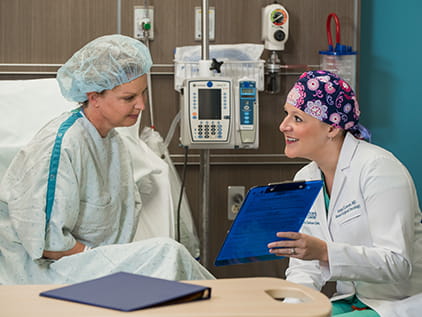- Home
- News Room
- Patient Stories Search Page
- Expert Cervical Cancer Care Keeps Designer’s Dreams on Track
August 13, 2019
Celebrating her daughter’s beach wedding, Rynette Reiling-Minor reveled in the sights and sounds of Cancun. She was determined to soak in the July 2017 event, despite having completed aggressive treatment for cervical cancer just days earlier.
Rynette’s remarkable cancer journey and her optimism throughout impressed gynecologic oncologist Lori Spoozak, MD.
“Rynette had a tremendous spirit as she walked through her diagnosis and treatment,” says Dr. Spoozak, a specialist at The Women’s Cancer Center at The University of Kansas Cancer Center, 1 of just 71 National Cancer Institute-designated cancer centers in the nation. “She fills the room with positive energy.”
A surprising cervical cancer diagnosis
A busy 48-year-old interior designer running her own company, Rynette wasn’t alarmed in spring 2017 when she noticed unusual menstrual spotting. “It really didn’t seem like a big deal, but when it didn’t stop after a few weeks, I decided to get it checked out,” she says. “My doctor took one look and told me I had an ‘angry uterus.’”
Rynette’s physician suspected advanced cervical cancer and promptly referred her to Dr. Spoozak for evaluation and treatment. “I was a hot mess, a real train wreck,” Rynette recalls. “All I could think of was my daughter’s wedding coming up and all my dreams about that day. Dr. Spoozak was wonderful. She told me we needed to get on this and that my only option was to shrink and kill the cancer.”
The cervical cancer presented as a large tumor that invaded the vagina. Further testing found metastasis to some pelvic lymph nodes. According to Dr. Spoozak, the lymph node involvement called for chemotherapy and radiation rather than surgery. The goal is to destroy the cancer cells, which slough off and are replaced with scar tissue. For Rynette, treatment needed to be aggressive and quick.
Team approach to cervical cancer treatment
Rynette’s multidisciplinary care team also included radiation oncologist Andrew Hoover, MD, at The University of Kansas Cancer Center. Working together, the physicians developed a treatment plan that involved weekly chemotherapy and daily radiation therapy, including both external beam radiation and brachytherapy, a form of radiotherapy that delivers radiation from an inserted or implanted source.
A gynecologic cancer nurse coordinator, an integral part of the team for every patient at The Women’s Cancer Center, worked with Rynette to coordinate care and serve as a point of contact for questions and concerns. “If I was going to make it to the wedding, I knew I couldn’t miss any treatments,” Rynette says. “I had to stay healthy and strong, so I did everything I had to do to avoid germs and take care of myself.”
An important aspect of maintaining strength throughout cancer treatment is proper nutrition, and Rynette found help through The University of Kansas Cancer Center’s nutritional support services. A licensed dietitian helped Rynette understand what and when to eat to avoid chemotherapy-induced nausea and maintain her overall health throughout her 6 weeks of treatment.
“The entire team was so gracious and really listened to me,” Rynette says. “They helped me stay organized and taught me how to take the best care of my body from the very beginning.”
Dr. Spoozak also marvels at her colleagues’ collaborative approach to patient care. “It’s remarkable here,” she says. “This is truly a unique environment in this region for exceptional care provided by people who are kind and gracious and want to help each other and our patients.”
Raising cervical cancer awareness
Rynette is enthusiastic about opportunities to share her story and help raise awareness. “I’m really honored to be able to share my experience with cervical cancer, as a lot of women don’t know much about it,” she says. “We have to get the word out about how to prevent and treat it, and I want to share that knowledge.”
Dr. Spoozak notes that prevention is key, and the HPV (human papillomavirus) vaccine is the best way to prevent the disease. The U.S. Centers for Disease Control and Prevention recommend that “all kids who are 11 or 12 years old should get 2 shots of HPV vaccine 6-12 months apart.” The vaccine, which is offered to adults up to age 45, also protects against HPV-related cancers of the head and neck.
“The other really important step is for women to schedule routine pelvic exams,” Dr. Spoozak advises. “We have very effective screening technologies now, and regular exams are important not only for women in their childbearing years, but for older women as well.”
Besides the clinical recommendations, Rynette wants to impress her positive message on others. “I’m kind of a glass-all-the-way-full kind of person,” she says. “There’s always hope and always a reason to be grateful.”
It’s been more than a year since Rynette stood on the beach in Cancun, and she’s cancer-free. She feels like her glass isn’t just full, it’s overflowing.

